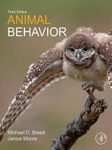By: Michael D Breed(Author)
250 pages, b/w photos, b/w illustrations, tables
![Conceptual Breakthroughs in Ethology and Animal Behavior Conceptual Breakthroughs in Ethology and Animal Behavior]()
Click to have a closer look
About this book
Contents
Customer reviews
Biography
Related titles
About this book
Conceptual Breakthroughs in Ethology and Animal Behavior highlights, through concise summaries, the most important discoveries and scientific revolutions in animal behaviour. These are assessed for their relative impact on the field and their significance to the forward motion of the science of animal behaviour. Eighty short essays capture the moment when a new concept emerged or a publication signalled a paradigm shift. How the new understanding came about is explained, and any continuing controversy or scientific conversation on the issue is highlighted. Behaviour is a rich and varied field, drawing on genetics, evolution, physiology, and ecology to inform its principles, and Conceptual Breakthroughs in Ethology and Animal Behavior embraces the wealth of knowledge that comes from the unification of these fields around the study of animals in motion.
The chronological organisation of the essays makes this an excellent overview of the history of animal behaviour, ethology, and behavioural ecology.
The work includes such topics as Darwin's role in shaping the study of animal behaviour, the logic of animal contests, cognition, empathy in animals, and animal personalities. Succinct accounts of new revelations about behaviour through scientific investigation and scrutiny reveal the fascinating story of this field. Similar to Dr John Avise's Contemporary Breakthroughs in Evolutionary Genetics, the work is structured into vignettes that describe the conceptual revolution and assess the impact of the conceptual change, with a score, which ranges from 1-10, providing an assessment of the impact of the new findings on contemporary science.
Contents
1. 50,000 Years Before Present: The Dawn of Human Evolution
2. 12,000 Years Before Present: Domestication
3. 1623 Social Behavior
4. 1700s Classifying Life
5. 1729 Biological Clocks
6. 1800s Birds in Their Natural Setting
7. 1800s The Great Explorers
8. 1859 Darwin and Behavior
9. 1859 Darwin and Social Insects
10. 1882 George Romanes and the Birth of Comparative Psychology
11. 1894 Morgan's Canon
12. 1914 Sensory Physiology and Behavior
13. 1938 Skinner and Learning
14. 1940 Orientation
15. 1941 Bat Echolocation
16. 1947 The Evolution of Clutch Size
17. 1948 Cognitive Maps
18. 1948 Hormones and Behavior
19. 1948 Information Theory
20. 1953 The Chasm Between Ethology and Comparative Psychology
21. 1954 Life History Phenomena
22. 1954 Zeitgebers (Time-Givers) for Biological Clocks
23. 1956 The Coolidge Effect
24. 1957 Psychophysical Laws
25. 1960 Motivation and Drive
26. 1963 The Four Questions
27. 1964 Dopamine and Reward Reinforcement
28. 1964 Inclusive Fitness and the Evolution of Altruism
29. 1965 Harry Harlow and Social Isolation in Monkeys
30. 1967 Island Biogeography
31. 1968 Tool Use
32. 1969 Territoriality and Habitat Choice
33. 1970 Sperm Competition
34. 1971 Behavioral Genetics
35. 1971 Reciprocal Altruism
36. 1971 Selfish Herds
37. 1973 Episodic Memory
38. 1973 Game Theory
39. 1973 The Many Eyes Hypothesis
40. 1973 The Red Queen
41. 1973 Animal Conflict
42. 1974 Caenorhabditis elegans Behavioral Genetics
43. 1974 Standardizing Behavioral Observation Methods
44. 1974 Parent-Offspring Conflict
45. 1975 Group Selection
46. 1975 Sociobiology
47. 1975 The Handicap Principle
48. 1976 Marginal Value Theorem
49. 1977 Self-medication
50. 1977 The Evolution of Mating Systems
51. 1978 Animal Models for Depression
52. 1978 Theory of Mind
53. 1980 Dispersal
54. 1980 Semantic Communication
55. 1980 The Risk Paradigm
56. 1981 Prisoner's Dilemma
57. 1981 Producers and Scroungers
58. 1982 The Hamilton-Zuk Hypothesis
59. 1982 The Hippocampus and Navigation
60. 1983 Reproductive Skew
61. 1985 An Animal Model for Anxiety
62. 1988 Brood Parasitism
63. 1990 Fear
64. 1990 The Challenge Hypothesis
65. 1991 Pain in Animals
66. 1991 Receiver Psychology
67. 1992 Working Memory
68. 1994 Ecosystem Engineers
69. 1996 Conservation Behavior
70. 1996 The Molecular Basis of Learning
71. 1998 Self-Organization of Social Systems
72. 1998 Gaze Following
73. 1999 Multimodal Communication
74. 2000 Emotion and the Brain
75. 2000 Social Amoebas and Their Genomes
76. 2002 Social Networks
77. 2004 Behavioral Syndromes-Personality in Animals
78. 2004 Maternal Epigenetics
79. 2004 Public and Private Information
80. 2014 Keystone Individuals
Customer Reviews
Biography
After receiving his PhD from the University of Kansas in 1977, Michael Breed came to Colorado to work as a faculty member at the University of Colorado, Boulder, where he has been ever since. He is currently a Professor in the Department of Ecology and Evolutionary Biology, and teaches courses in general biology, animal behaviour, insect biology, and tropical biology. His research program focuses on the behaviour and ecology of social insects, and he has worked on ants, bees, and wasps. He has studied the nestmate recognition, the genetics of colony defence, the behaviour of defensive bees, and communication during colony defence. He was Executive Editor of Animal Behaviour from 2006-2009.
By: Michael D Breed(Author)
250 pages, b/w photos, b/w illustrations, tables

































